The fluffiest and crunchiest Greek Easter cookies (koulourakia) you have ever tasted! These sweet little Greek Easter cookies are super quick to bake, so much fun to make and highly addictive to eat! So consider yourself warned 🙂 Serve over a hot cup of Greek coffee and you have a match made in heaven!
This is the exact recipe my grandmother used to make Greek Koulourakia every Easter and I’m excited to share it with you to recreate this delicious traditional delight from scratch!
This recipe makes 80 of these delicious festive Greek Easter cookies which are plenty for everyone to try. And the best part? You will have tons of fun with the whole family kneading the koulourakia into braids, boats, little ‘S’s and so forth! Your imagination is the limit!
Koulourakia (Greek Easter cookies) – what leavening agent to use?
Greek koulourakia recipes are characterised by a butter base, shiny egg glaze (which makes them beautifully golden brown) and one of three potential leavening agents to make them fluffy and airy.
Nowadays most koulourakia recipes call for baking powder and baking soda as a leavening agent, but experience has shown me that nothing compares to the traditional koulourakia recipe, which calls for baking ammonia.
Bakers ammonia (ammonium carbonate) was the primary rising agent used in baking, before baking powder and baking soda was invented. Baking ammonia makes the koulourakia amazingly airy and crunchy and, compared to other rising agents, their crispness will last longer. Also they won’t crack on the outside and they will keep that deliciously smooth texture!
Tip: If you have trouble finding baking ammonia, you could substitute with double acting baking powder (1:1 proportion). You could also replace all purpose flour and ammonia with self rising flour. Also don’t forget to open a window while baking as the ammonia smell can be strong but it will dissipate once the cookies are cooked.
How to shape your Greek Easter cookies?
Shaping the Greek Easter cookies is really easy. Just pinch off a small ball of the dough (approx. 1 inch/3cm in diameter) and roll it into a rope. You can then try to:
- Twist it into “braids”
- Fold them in 3 to form little boats
- Shape into an S
- Or just let your imagination run wild and form the dough in any shape you like!
Other delicious Greek Easter traditions to explore
As most holidays in Greece revolve around food, Greek Easter is no exception! These are the days when households are preparing delicious meals for the Easter Sunday and are making all these delicious traditional Greek recipes! So go ahead, explore them all below!
- Tsoureki (Greek Easter bread)
- Easy Tsoureki in a bread machine
- Greek style roast lamb with potatoes
- Kontosouvli (spit roasted bbq pork)
- Magiritsa (Greek Easter soup)
- Dyed Greek Easter eggs
- Lazarakia breads
- Greek olive oil cookies
Finally why not check out my other delicious Greek Easter Recipes here and let me know what you think!
Print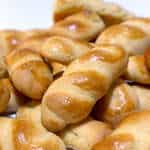
Koulourakia recipe (Greek Easter cookies)
- Prep Time: 40 min
- Cook Time: 30 min
- Total Time: 1 hour 10 minutes
- Yield: 80 pieces 1x
- Category: Dessert
- Method: Baked
- Cuisine: Greek
Description
The fluffiest and crunchiest traditional Greek Easter cookies recipe (koulourakia) you have ever made! These sweet little Greek Easter cookies are super quick to bake, so much fun to make and highly addictive to eat! Discover how to bake them to perfection with this traditional Greek recipe.
Ingredients
- 250g butter (8.8 oz.)
- 1 1/2 cup plain white sugar
- 13g powdered baking ammonia (2.5 tsp, flat). If you have trouble finding baking ammonia, or you don’t like the taste, you could substitute with 2.5tsp double acting baking powder.
- 1/2 cup lukewarm milk (130ml)
- 4 medium eggs
- 1 tbsp vanilla extract
- zest of 1 orange
- 1kg all-purpose (plain) flour (35 oz.)
- 2 egg yolks and 1 tbsp water for glazing the koulourakia
Instructions
- To prepare this traditional koulourakia recipe, start by mixing the butter and sugar. In a mixer’s bowl add the sugar and butter (chopped) and mix for about 10-15 minutes, until the butter is creamy and fluffy. (Once starting to prepare this koulourakia recipe, make sure that the butter is at room temperature).
- In the meantime warm the milk until lukewarm and remove the pot from the heat. Add the ammonia and whisk until fully dissolved. Set aside.
- In the butter-sugar mixture, add the eggs one at a time, whilst mixing, allowing time for each one to be absorbed, before adding another. Pour in the the vanilla extract, the orange zest and the milk & ammonia blend and mix to combine. Add the flour, a little bit at a time, whilst mixing, until the ingredients are combined and the dough is soft and not too sticky.
- Cover the dough for the koulourakia with some plastic wrap and set aside to rest for 30 minutes.
- Place the dough for the koulourakia on a clean working surface, take a small piece of dough and form long cords. Shape the koulourakia with your hands, giving them any shape you like.
- Line a large baking tray with parchment paper and place the koulourakia, leaving some distance between them as they will rise a lot when baked. For this koulourakia recipe, you will need approx. 4-5 large baking trays, depending on the size of the cookies you make.
- In a small bowl add the egg yolks and 1 tbsp water and whisk with a fork. Brush the top of the koulourakia and bake in preheated oven at 200C/400F fan for 15-20 minutes, until fully cooked and golden brown on the outside (or the ammonia would not have been fully used up).
- Let the koulourakia cool down completely on a cooling rack and store in airtight containers for up to three weeks.
Nutrition
- Serving Size: 1 cookie
- Calories: 88kcal
- Sugar: 3.9g
- Sodium: 4.9mg
- Fat: 3g
- Saturated Fat: 1.7g
- Unsaturated Fat: 1.1g
- Trans Fat: 0g
- Carbohydrates: 13.6g
- Fiber: 0.4g
- Protein: 1.7g
- Cholesterol: 19.5mg
Recipe image gallery:







Oh and you can always read this delicious recipe in Greek here Αφράτα Πασχαλινά κουλουράκια με αμμωνία.

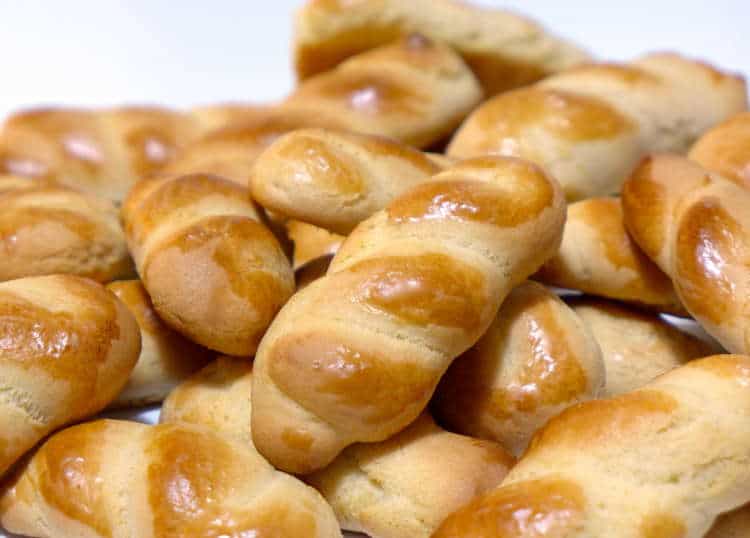
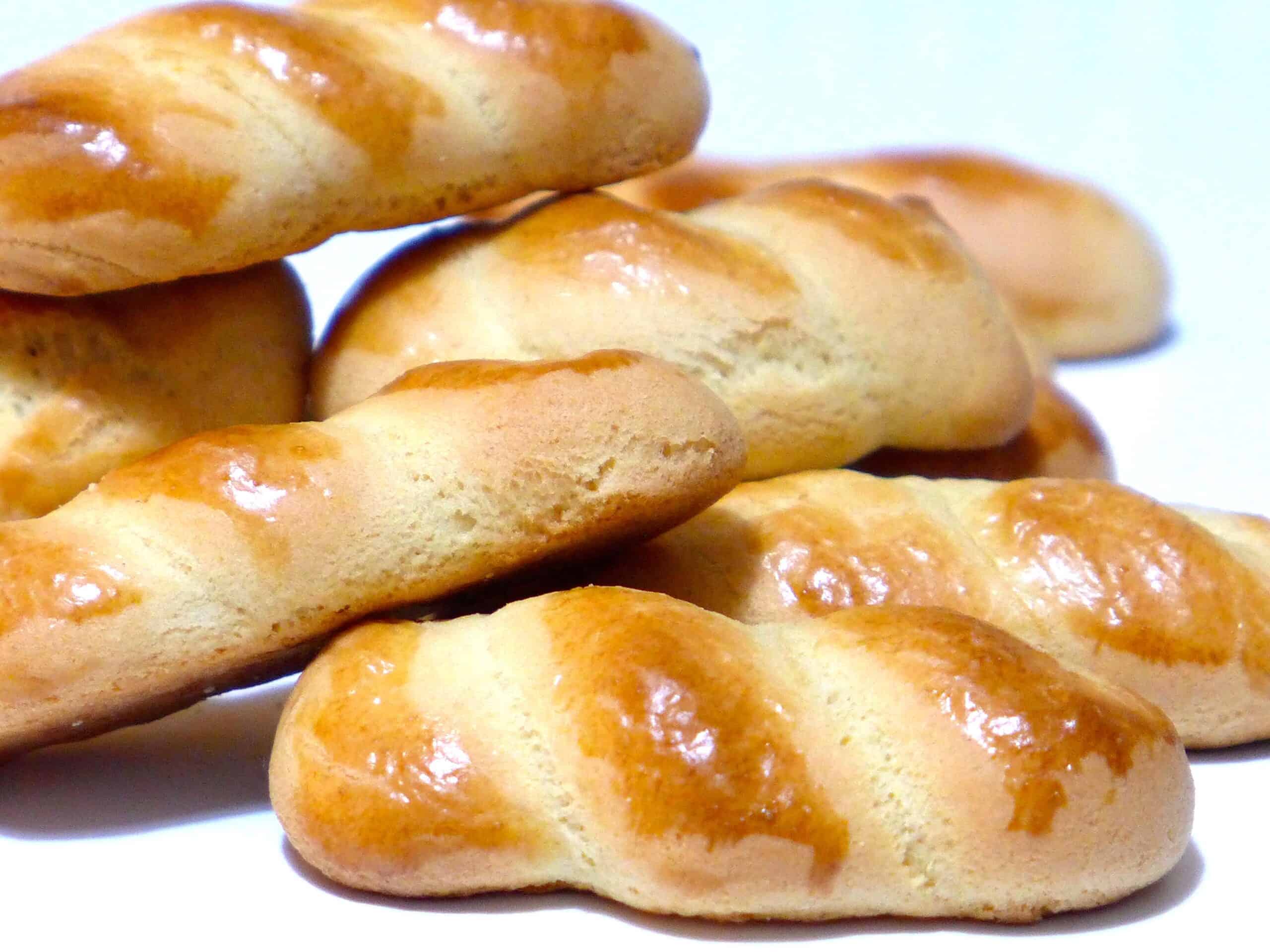
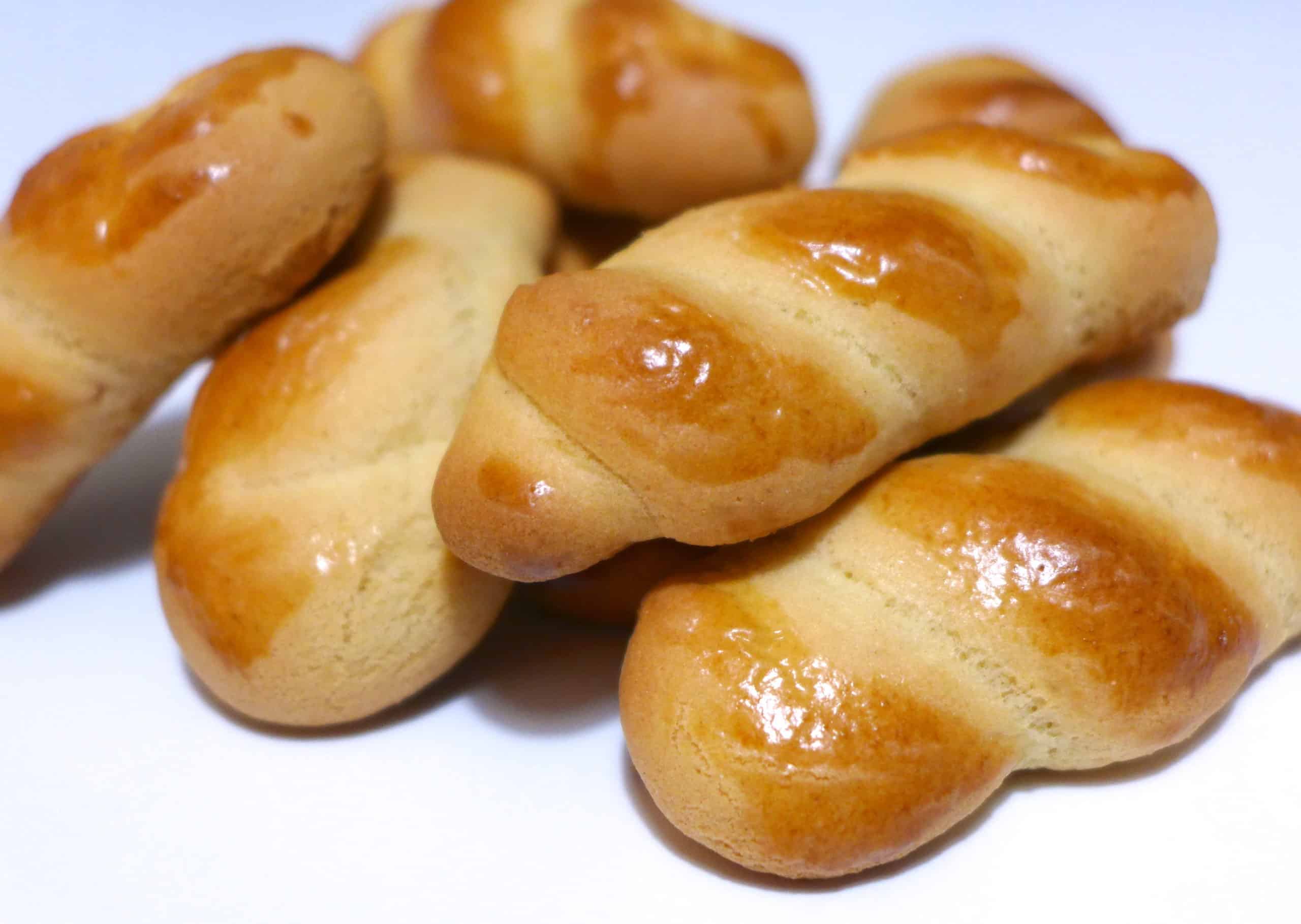
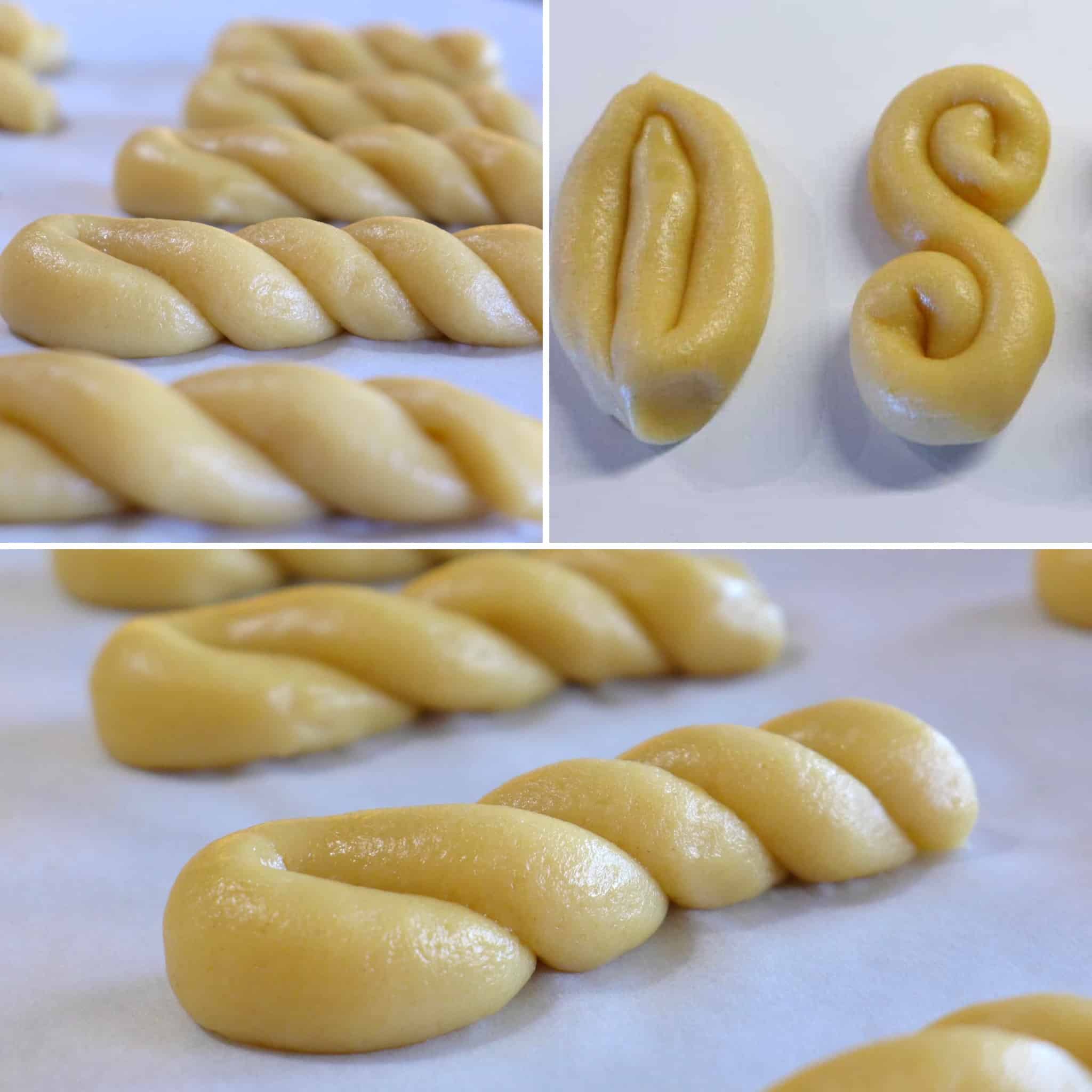
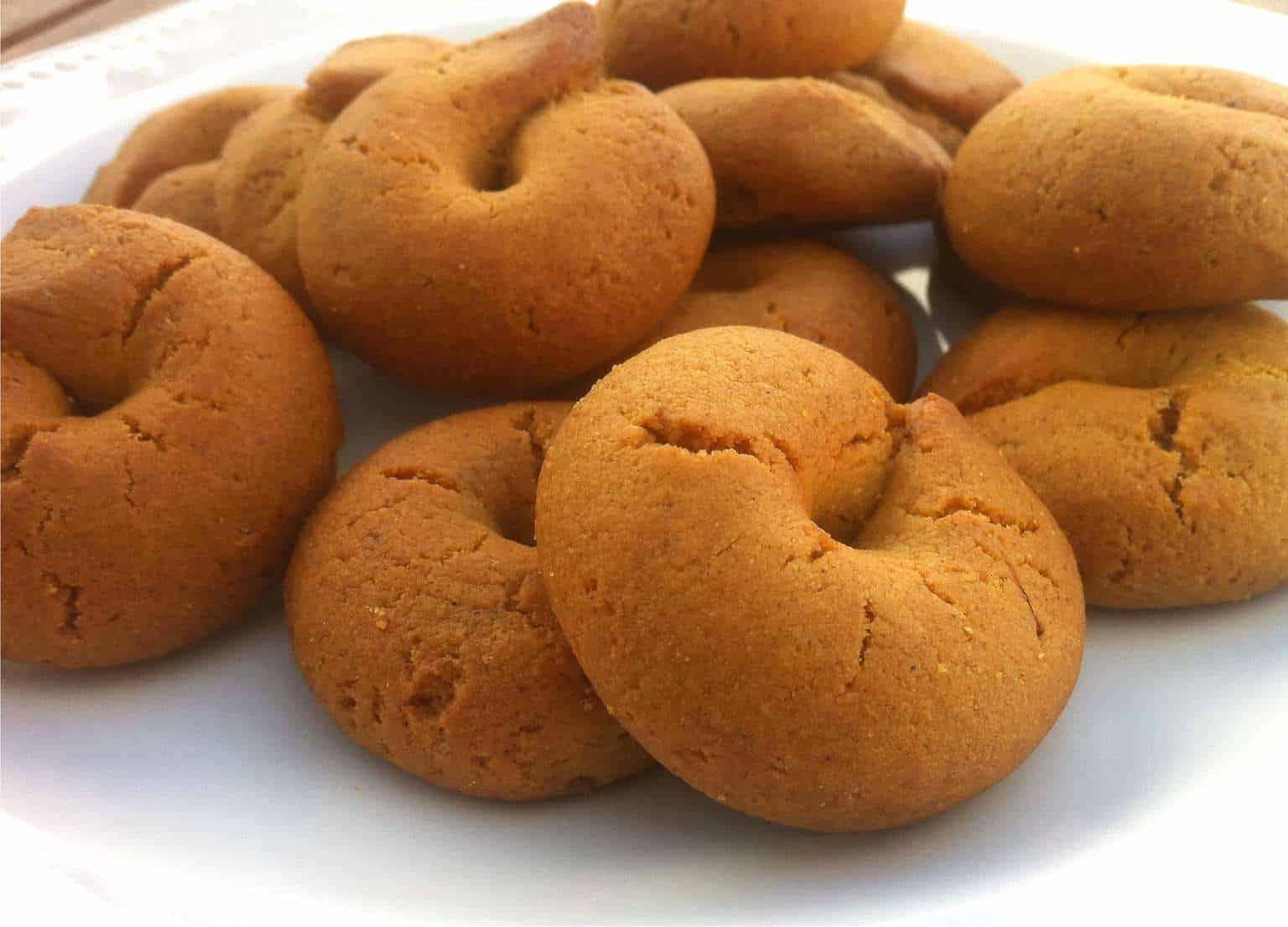
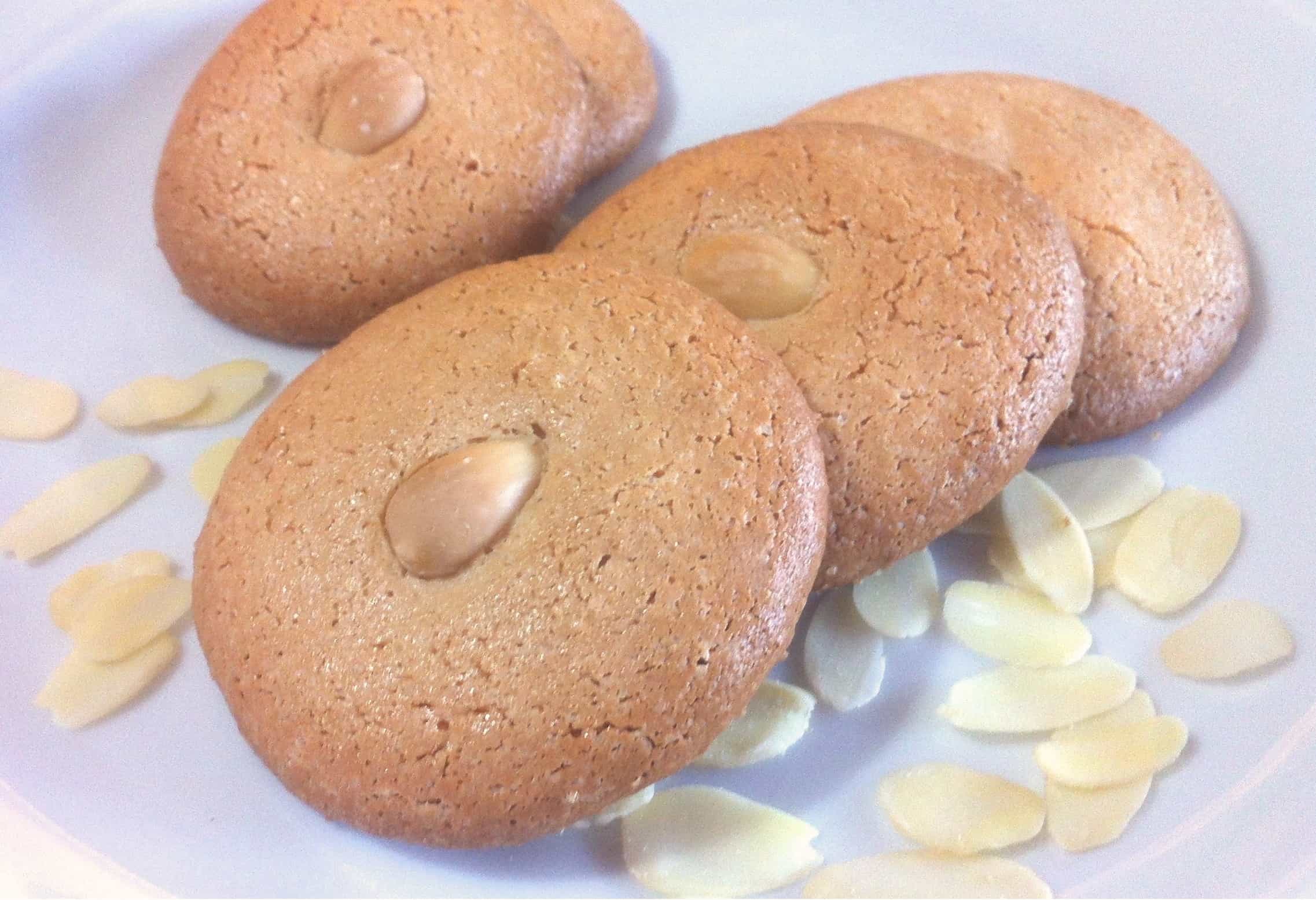
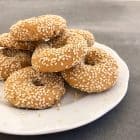

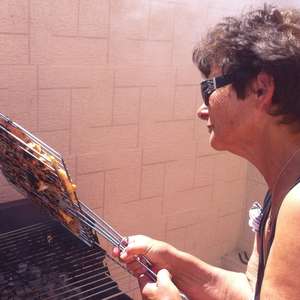
Amazing I used self raising flour and they turned out so soft and fluffy
Hi Paraskevi
Indeed, self raising flour is perfect for this recipe! Just skip the baking ammonia which has a similar effect. Glad you loved them 🙂
Love
Eli
What is the meAsurement of one glass in cups? Also why no baking powder or soda. The ammonia is enough for them to rise?
never mind I see your recipe uses cups. I will try this today! thanks for this recipe!
your welcome Mina. Be warned on the ammonia though, 1.5 tea spoons is enough. Alternatively you can use baking powder. Love, Eli
Elli, this looks divine! I cannot get the ammonia in time to bake these can I just use the same amount of baking powder?
Just replace the flour with self raising flour and skip the ammonia altogether. No need to use anything else.
How many cups is 1 kg flour? When i convert it online it says 10 cups which sounds way too much ?
The cookies did not look like the pictures , they were a white color , any suggestions . I baked them at 400 degrees, second rack from bottom .
Maybe they needed a little longer in the oven.. Did you use the egg to brush them over?
Love
Eli
Made these kouloria also with self raising flour everyone loved them love your recipies!
Ah thank you Dora 🙂
Hi Tassia
It was a typo..
Love
Eli
Sorry would like to know do you completely change plain flour for self raising I made this and they tasted fantastic but where very hard
Mine were white and also very hard and threw them out. Made another batch with self raising flour, with no ammonia & no baking powder and they were perfect.
Hi Eli …
Since 80 is A LOT of cookies for the 2 of us …. Can I cut the recipe in HALF ??
When you say hard, do you mean very crunchy, or tough?? Thanks!
Made these last night and they were the best I’ve ever made thanks for the recipe. Have tried several recipes over the past years and this is definitely a keeper.
Did you stick to the recipe exactly, or swap out the flour for Self Rising? I’m about to bake these in a little while, and would like to know. Thanks!
I made the easter cookies they are delish
Can you tell me how much baking powder or soda to use in place of the ammonia?
Just replace the flour with self raising flour and skip the ammonia altogether. No need to use anything else.
Eli, I have been searching for a recipe like this for a long time. Finally I found it.
My family when crazy over them. Brilliant recipe and so easy. I did make it with the SR flour. I didn’t have any oranges so I put a little cinnamon. Delicious!!!! Thanks Eli!
Oh my goodness thanks I don’t have any oranges so I was thinking of getting up early on the morning go to supermarket and then do them before work thanks for letting us know can I use all purpose flower?
Made them over the weekend using self raising flour and they turned out to be perfect. Thank you for such a simple yet perfect recipe
Made them over the weekend using self raising flour and they turned out to be perfect. Thank you for such an easy and perfect recipe!
Your recipe is good , but where I come from in no way do we use orange juice or zest for Easter koulouria , there is a *portokali* koulouri .
My family comes from Salonika and they use orange for these cookies. I’ve never had to make them myself but now I will.
I plan to use self rising flour. Do I eliminate the milk too? Or just the ammonia?
How much self rising flour would you use and what ingredient do you replace with? I noticed many using self rising flour but what did they skip?
Just replace the flour with self raising flour and skip the ammonia altogether. No need to use anything else.
These are perfect, the best recipe I have found so far. I made them with self raising flour and didn’t add the ammonia
If I use the self rising flour…. Do not still use the milk????
I think you’ll still going to need the milk even with self raising flour 🙂
Hi, what is the measurement for sugar in grams please and the milk in mls?
Many thanks
Im a bit confused – does this ‘bakers bowl’ consist of an electric whisk? how do i combine the ingredients together?
I usually use a kenwood chef when baking 🙂
I followed the recipe but the dough became crumbly with the amount of flour specified. What did I do wrong?
Probably your flour was a little stronger than what I used when making the recipe – next time try adding the flour a little at a time and keep an eye out for the texture of the dough. If it gets too hard stop adding flour. If you’ve added too much, try adding a bit more butter to soften the dough.
When rolling the dough into ropes, how thick should the ropes be? What diameter?
Just wondering if i can substitute the milk with orange juice?
I am planning on making these for my (Greek) Father in Lae for Easter. I have managed to track down the baking ammonia so I hope they taste as good as his Nona used to make. My question is what is the traditional shape of a koulourakia or isn’t there one?
i made the other day and im not greek…i accidently used wholemeal plain flour and used baking powder they taste good but are a little dence… i did the ropes but they turned out like pretty large buscuits… is there a particular share or size they need to be?
Can I make and refrigerate the dough the night before and roll them in the morning?
How much does the dough for each cookie weigh? I’m trying to figure out how much to use for each to make a good size?
Would it be possible to have the recipe in grams instead of cups?
Thankyou!
Hi there. I just made these trying to replicate my late mother’s koulourakia. Here’s we’re always crisp and delicious. I followed you’re recipe exactly yet the smell of ammonia is intense. I’ve baked them golden as my mom did. Bottoms are fully brushed. Dough raised tremendously. They still smell a lot like ammonia even being out of the oven for twenty minutes. Any idea why???
Baking ammonia breaks down in the oven. It may take an hour or so out of the oven before they are completely smell free. Alternatively they may need a little bit extra baking.
I just made these for my family for Easter and they taste exactly like the koulourakia my yiayia made.
Thank you so much for this recipe and have a happy Easter!
Your welcome Shade! I’m so glad you liked my Koulourakia recipe!!
Hey mate, what kind of sugar is used in this recipe? Would I just be able to use raw sugar or do I need to use white sugar? Cheers
Hi Mark
Its regular plain white sugar!
Is the amount of ammonia too much? I used this amount and the smell was overwhelming.
Hi John! Do you mean the smell while they are baking? This is normal. After baking them the cookies will become smell free. It is important though to dissolve the baking ammonia in lukewarm milk and also for the cookies to cook through when baking – they need to turn golden brown :)!
I live in America and just made the cookies using self rising flour. They baked very well but were very salty. I did not add any salt. I just learned that the seed rising flour in America has a lot of salt in it. It appears self rising has salt added and self raising does not.
How much orange zest do I need? From the whole orange or just a side? Do you use orange juice also?
Hi Anna, its the zest from one whole orange. No juice needed!
When I’ve made them before I used a recipe our priests wife gave us and it uses Cake flour. They turn out so nice.. now i want to make them.right now…
Go ahead and don’t forget to send me a picture @mygreekdish on instagram :)!
These cookies are fabulous! I made them every year for Christmas and give them to friends and neighbors even though they’re an Easter cookie. You are my go to Greek recipe website. Ευχαριστούμε!
Can you half this recipe?
Hi do you know if I can put the dough in the fridge overnight to roll in the morning or better to leave out on the counter. Thank you so much
Best to pop it in the fridge, but take it out an hour or so before shaping them, to allow the dough to warm up to room temperature.
I have only plain flour to use is that okay? Or do I need self rising?
Can I use bleached all purpose flower and skip the oranges as well?
What alcohol with OJ? Ouzo,Sambouka AND SUB sugar with Stevia?
https://download-install.com/tag/유튜브20밴스드